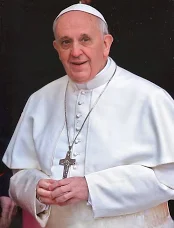On the World Day Against Trafficking in Human Persons, which is observed today, Friday 30 July, Pope Francis, in a tweet said, “I invite everyone to work together with the victims to transform the economy of trafficking into an economy of care.”
Between 20 and 40 million people are estimated to be trapped in modern slavery today, an illegal business which earns billions of dollars for traffickers.
Talitha Kum, the global anti-trafficking network of Consecrated Life Against Trafficking in Persons, recently launched a campaign entitled #CareAgainstTrafficking.
The new initiative aims to show the world how “care” can make the difference “along every step of the journey to combat human trafficking: care for those at risk, care for victims, and care for survivors.”
In 2020, Talitha Kum networks worldwide cared for 17,000 survivors of human trafficking, providing safe housing, education and job opportunities, support to access justice and compensation, and healthcare and psychosocial assistance.
Speaking with Vatican Radio, Sister Gabriella Bottani, CMS, international coordinator of Talitha Kum, said this World Day Against Trafficking in Persons is an significant day, especially in Asia.
“Yes, today is an important day because the Asian networks, especially in the South and South-East, have identified young people who, having come into contact with our networks, have accepted the challenge of starting a process to become ambassadors. Sentinels, presences that promote a culture of care to fight trafficking.”
Sr Bottani also spoke of the importance of testimony in the battle against trafficking saying:
“In a virtual context to which we are accustomed, think of the use of social media, this reminds us of the importance of reality. A difficult, violent and painful reality, but one that is also full of hope. I believe that young people should hear these testimonies, experience hope as an engine for dreams… So to have a survivor with us who reminds us of the importance of staying with our feet rooted in reality, with a head that dreams and a heart capable of realising our desires for good is really fundamental, it’s beautiful.”
Learning from victims
The theme for this year’s UN World Day Against Trafficking in Persons is “Victims’ voices lead the way.”
The United Nations says that “the campaign portrays survivors as key actors in the fight against human trafficking and focusses on the crucial role they play in establishing effective measures to prevent this crime, identify and rescue victims and support them on their road to rehabilitation.”
The world body also notes, “Many victims of human trafficking have experienced ignorance or misunderstanding in their attempts to get help. They have had traumatic post-rescue experiences during identification interviews and legal proceedings. Some have faced revictimization and punishment for crimes they were forced to commit by their traffickers. Others have been subjected to stigmatization or received inadequate support.”
“Learning from victims’ experiences and turning their suggestions into concrete actions will lead to a more victim-centred and effective approach in combating human trafficking,” the UN says.
Targeting the vulnerable
In his message marking this World Day, the UN Secretary General, Antonio Guterres, called on states to take action against this scourge, highlighting that many of those who are trafficked are children.
The UN chief also stressed that due to the fact that around 124 million people have been left in poverty due to the pandemic, this has meant “many millions” have now been left vulnerable to human trafficking.
ENDS
Source: Vatican News article

